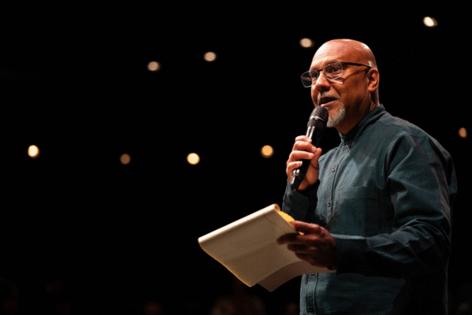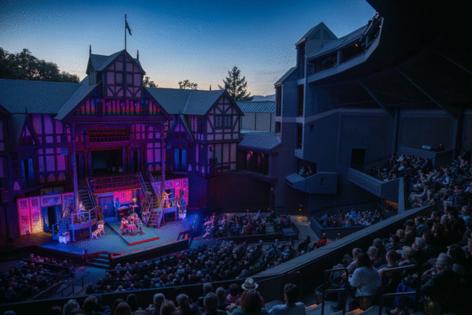Oregon Shakespeare Festival hits bump in the road amid 90th anniversary
Published in Entertainment News
SEATTLE — On June 20, at the start of a busy summer weekend during Oregon Shakespeare Festival’s 90th anniversary season, the venerable theater company announced that Gabriella Calicchio would be stepping down as the organization’s executive director, after less than nine months in the role.
Javier Dubon, OSF’s director of marketing since 2023, has been named OSF’s interim executive director, and will assume that role’s responsibilities in addition to his current position. OSF declined to provide more details about Calicchio’s sudden departure. No timeline has yet been announced for a search for a permanent executive director, but Dubon said he is “willing and ready” to serve in the interim role as long as is necessary.
This abrupt transition is the latest hurdle for the storied theater company in Ashland, Oregon, which has delighted West Coast theater lovers for nearly a century. OSF, currently in the middle of its 90th season, was hit hard by COVID shutdowns of both live performance and tourism and may face further impacts as the Trump administration targets the National Endowment for the Arts.
Still, the company remains optimistic, and artistic director Tim Bond stressed that Calicchio’s departure doesn’t signal disruption for the organization.
“We’re actually in the process of stabilizing, and this is just part of that,” Bond said. “Javi is amazing and I’m excited to partner with him. There will not be any feeling of any change except for positive momentum, truly. If I felt any differently, I would say that, but I feel really good about where we’re going.”
Road to recovery despite uphill battles
Dubon is dedicated to making sure things run as smoothly as possible for the more than 400 people who work at the festival, either on stage, backstage or in the administrative offices. Big ideas and visionary changes are important, he said, but his top priorities are to make sure that basic processes are held to a very high standard and to make sure things are in good shape for the new executive director, whenever they arrive.
“When transitions like this happen, it might seem very jarring for it to happen so soon in someone’s tenure,” Dubon said. “But I’d argue that, ultimately, if something is not going to work out, it’s much better that it happens sooner rather than later.”
Like many nonprofit theaters, OSF is still recovering from the setbacks of the COVID-19 pandemic that closed theaters for months, if not years, and shifted audience behavior forever.
Bond, who had previously served as OSF’s associate artistic director from 1996-2007, took the reins as artistic director in 2023 and immediately jumped into emergency fundraising mode, raising more than $6 million in his first 10 months on the job.
That growth trajectory continued last year when Bond (who worked in Seattle for many years at organizations including The Group Theatre and the University of Washington School of Drama) hired longtime Seattle artists Rosa Joshi and Kaytlin McIntyre as OSF’s associate artistic director and director of repertory producing, respectively.
Together, the OSF team continues to rebuild audiences and critical programs that were shut down during COVID.
“We’re not quite at the (audience) levels that we were pre-pandemic,” Dubon said. “But we are trending close to 50% of sales, year over year, above where we were at the same time last year.”
Rebuilding audiences for its shows (which, this season, are on the whole, terrific ) is just one piece of OSF’s recovery puzzle. Reviving its school visit program, a longstanding OSF education program that sends artists to middle and high schools throughout the Western states and beyond, is another one.
“It’s a very important part of our mission, and it fell away for a while,” Bond said. “We just started it back last year, and we’re hoping to keep building that program. It’s key for our survival as a field that we bring the next generation along.”
Also key: Training the artists and arts leaders of tomorrow. That’s why Bond and his team prioritized restarting FAIR (Fellowships, Apprenticeships, Internships and Residencies), an OSF program that Bond founded some 20 years ago and which shuttered during COVID.
“When I was here before, it was not a diverse company at all, racially or culturally,” Bond said. “We work very hard in the FAIR program to make sure we’re really being inclusive, and that’s brought an influx of new cultures and perspectives that entirely transformed the entire culture of OSF.”
When Bond left his first stint at OSF some 18 years ago, he began directing in theaters all over the country. He met countless people who had been through FAIR at OSF and gone on to leadership positions at theaters nationwide. “It just brings tears to my eyes and fills my heart with this sense of joy that this program has seeded the entire field,” he said. “It’s very important, and that’s why I wanted to get it back.”
This season, Bond said, the company has 23 FAIR participants working in all areas of administration, artistic and production roles.
While OSF doesn’t get much money from the federal government, Bond said, the financial upheaval surrounding arts at the federal level (such as the Trump administration’s targeting of the National Endowment for the Arts ) is having a trickle-down effect that could potentially hurt the company’s state funding. “Also, the way the education department is getting whacked at the federal level is making it harder for schools to be able to come (to OSF),” Bond added.
Despite some uphill battles, OSF is on “a very positive trajectory,” he said. “The (audience) response has been extraordinary to the shows this year, so we’re just going to keep right on going.”
———
Oregon Shakespeare Festival
Ticket prices and dates vary for shows, which run concurrently through October. Find more details about the Oregon Shakespeare Festival at osfashland.org; box office: 800-219-8161.
———
© 2025 The Seattle Times. Visit www.seattletimes.com. Distributed by Tribune Content Agency, LLC.


















Comments